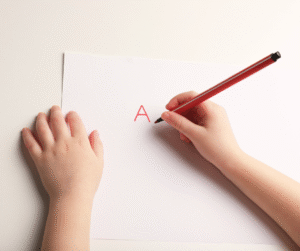Today, we are going to go down the rabbit hole to learn how I taught my neurodivergent kid who does NOT have dyslexia or dysgraphia to write. Before we get started, I need to share that reading was easy for this child, it came naturally. Writing was difficult due to the coordination required. Writing is a complex task, and with a neurodivergent child, the many skills of writing are often very difficult for them to put together.
The Basics
There are several steps your child has to learn to become a good writer. For my kids, I broke these into separate things that we worked on, before we ever thought about putting them all together. First, your child needs to be able to communicate verbally (non-verbal students may find a way around this, but for today we will focus on the verbal ones). Work on reading your child stories and asking them questions, then ask them to tell you the story. Most of us will never write better than we speak, so having conversations with your child and helping them develop their verbal skills is essential.
Next, I introduce handwriting, after working on drawing shapes and learning how to hold a pencil properly. For a lot of neurodivergent kids, handwriting is difficult and tedious. Their brains may struggle to retain how to make letters, so they need to look back at an example often when writing a word. It is very important to teach every letter, carefully, and review them many times for kids to really retain them. Some students, do best being allowed to write in all capitals for a while, as they learn to write. Capital letters are easier to make, as they have simpler shapes than lower case. Using a homeschool or handwriting specific program to teach the letters is easier for most people. I do recommend making it as multisensory as possible, to help the brain retain the letter shapes. I also move on to copy work and recommend it as part of your child’s education for several years, until they have the skills to write more original work.
As a note, all of my kids did learn to type their work, as typing is essential in this day and age. However, we never just gave up on having functional handwriting. To this day, many doctor’s offices, the DMV and other essential places expect you to fill out forms by hand. So, handwriting isn’t something I ever give up on.
Spelling is one of those skills that is hard for many kids, and easy for others. Either way, it is essential for writing. I recommend introducing a formal spelling curriculum around age 8, assuming your child has basic reading under control at that point. There is not much use in spelling if the child can’t read what they write. My autistic child did best with having the right number of blanks to fill in the letters when we first started spelling. They couldn’t hear how many sounds were in a word at first, so having three boxes or blanks to fill in when asked to spell cat, helped them figure out how many sounds to listen for and write down.
Grammar
Grammar has three parts, as far as I am concerned. There is grammar of our spoken language that you should work on when your child is speaking. Learning to use the right verb tense, for example, should come naturally to them because they have heard you use it, and you have corrected them when they used the wrong one. Most kids don’t need a workbook for this, they just need to talk to people to learn what “sounds right.” For children who struggle with language, diving into a focus on verbs and nouns etc may help, but not all kids really need that.
The next part of teaching grammar, is working on learning the rules about punctuation. There are a wide variety of ways to do this. Some kids do great with work books, others can pick it up from copy work- though that was too vague for my kid. Explicit teaching is often necessary for this, as the rules for commas and semicolons are not natural to most of us. Not all languages even use such things! For me, this is a middle school skill to work on. Middle school is also a great time to work on those nouns and verbs, as kids are old enough to understand the abstract concepts at this point.
The last piece of teaching grammar is learning to correct the grammar of something that either you or someone else wrote. My kids work on this in high school. There really is no reason to have the skills of an editor in the younger years, in my opinion. Reading for errors in an essay is an incredibly complex task. It requires a lot of knowledge and critical thinking. Pushing kids to do this advanced skill too soon can teach them to hate writing before they can really even do it.
Higher Level Skills
This might sound crazy, but I didn’t expect my kids to write really good sentences on their own until 8th grade. And in truth, most of my kids focused on creative writing for 8th and 9th grade. My autistic child only wrote about DnD for that school year, and I just asked to read what he was already writing and worked with him on making his writing better. I gave gentle feedback about turning clauses in to full sentences and encouraged him to use more adjectives. He was sharing what he wrote with his group, so he did want it to be well written. Another child started a blog that they wrote for a short while at that age, which presented another opportunity for me to provide proof reading and encouragement on how to write for others.
By 10th grade we were working on a few more writing skills. Practicing writing outlines of things they read helped prepare them to outline things they would later write. Writing simple summaries of stories prepared them for essay writing. They also worked on writing answers to questions about poems or short stories. We worked on writing good paragraphs.
In 11th and 12th grade I finally get around to writing essays. Why wait so long? Because I want them to be able to write great college essays. If we had started essays sooner, they would have learned bad habits. They would not have had the actual skills to write something good. In our homeschool, my kids are expected to write good essays, and the truth is that younger students often don’t have all the underlying skills to write something good. So, they cheat and use AI or they learn to write lots of words that mean nothing, just to fill the page.
My 11th and 12th graders type these essays, typically. Handwriting more than a paragraph just isn’t practical for them. For my child who had no problem writing about themselves, we used the Brave Writer Help for High School program. For my student who was not confident in personal essays, we used Writing Workshop level F. Both of those programs led to my kids having the skills they needed to write college essays. The child who used Writing Workshop ended up doing more essays that I assigned to help bring along their writing skills than the program required. I saw there was a need for practice, so I asked the internet for a list of essay ideas that went with a book we had read for school, and it supplied tons of ideas I could assign.
Both of my older kids have done well in the English classes they have taken at our community college, despite this slowed down approach to writing. Or maybe it was because of it? They read a lot. They worked on putting all the skills together in a way their brains could handle. We didn’t push them to do more than they were actually ready for. This led to strong writers. They never needed to cheat, because they were always able to complete the work.







0 Comments